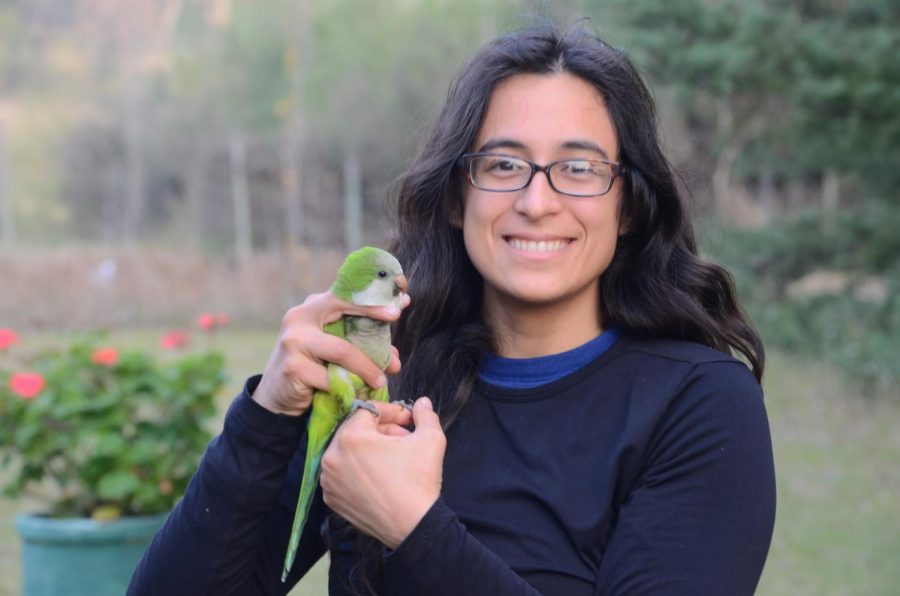NMSU Ph.D. candidate earns prestigious NSF Postdoctoral Fellowship
More stories from NMSU News Center
Date: 05/26/2020
Writer: Minerva Baumann, 575-646-7566, [email protected]
She may not talk to birds, but Grace Smith-Vidaurre listens to them. What she has learned from studying parakeets will propel her career as a researcher to the next level, after she receives her Ph.D. in December from New Mexico State University.
NSF fellowships are the oldest in the nation, awarded to the top scholars in the country. Smith-Vidaurre is one of several NMSU biology students chosen to receive a National Science Foundation Postdoctoral Fellowship. She is the third graduate student from NMSU biology professor Tim Wright’s lab to earn this highly competitive award.
“Grace is a potent mix of dogged and creative, which enables her to devise interesting projects and then see them through to completion,” Wright said. “Grace will finish her graduate career not only with several important papers from her own dissertation, but with an impressive array of papers resulting from collaborators who have sought her out to work with her.”
Smith-Vidaurre spent a year in Uruguay under a Fulbright Fellowship to do field research for her dissertation on the monk parakeet, a species native to South America, which has been introduced around the world through the pet trade.
“In my Ph.D. research, I’m studying an invasive parrot to contribute to our understanding of vocal learning, as well as adaptation to new habitats,” Smith-Vidaurre said. “Vocal learning is the ability to learn vocalizations from family and social companions. This trait is shared by distantly related mammalian and avian species, including bats, humans, songbirds and parrots.”
Smith-Vidaurre’s two-year NSF Postdoctoral Fellowship begins in February 2021 and will provide a salary and research stipend to continue her research with co-mentors Erich Jarvis at The Rockefeller University and NMSU alumna Elizabeth Hobson at the University of Cincinnati.
“This research will use zebra finches, a songbird that has been an important model system for vocal learning research for decades, Smith-Vidaurre said. “As an NSF fellow, I’ll address how the early-life environment influences vocal learning. I will ask how stress, experienced early in life, alters vocal learning phenotypes through heritable epigenetic variation, or molecular variation beyond the genetic code.”
Born in Rhode Island into a bicultural household with close-knit family ties in Nicaragua, Smith- Vidaurre chose NMSU for her graduate education after reading Wright’s published research on parrots and the evolution of vocal learning.
“I accepted Grace as a Ph.D. student in January of 2013 and was able to arrange for her to work that spring and summer as a field assistant in Costa Rica on a project on hummingbird behavior led by my Ph.D. student Marcelo Araya-Salas,” Wright said.
Smith-Vidaurre’s work with Araya-Salas developed two other important projects: a new package for sound analysis called warbleR, which streamlines acoustic analysis of functions of the structure of certain animal acoustic signals and is becoming more widely used in the animal communication field; and a paper based on Smith-Vidaurre’s work done as Marcelo’s field assistant that appeared in the “Proceedings of the Royal Society B” journal last year.
Not only has Smith-Vidaurre been hard at work on her own cutting-edge research in Wright’s lab, but she also has mentored two undergraduate researchers through NMSU’s Howard Hughes Medical Institute and the Maximizing Access to Research Careers Research Scholars programs.
“I am proud of Grace because on the way to earning this achievement for herself she has contributed immensely to the intellectual life of my lab by sharing her knowledge with her fellow graduate students and by serving as a generous mentor to her undergraduate researchers Clara Hansen (HHMI) and Valeria Perez (MARC),” Wright said.
Wright is looking forward to seeing Smith-Vidaurre continue her mentorship as an independent researcher.
“Another important part of my fellowship is to help under-represented minorities participate in science,” Smith-Vidaurre said. “I aim to do so by mentoring undergraduate students in independent research, developing bilingual materials to teach coding for data analysis and holding coding workshops in New York and Cincinnati to disseminate quantitative skills.”
Smith-Vidaurre plans to pursue a second postdoctoral fellowship and then a faculty position where she can open her own lab.
“NSF postdoc fellowships are intended to foster research independence and unique training opportunities,” Smith-Vidaurre said. “I’m very excited, because this NSF fellowship will allow me the independence to pursue my own research interests as well as new collaborations.”

